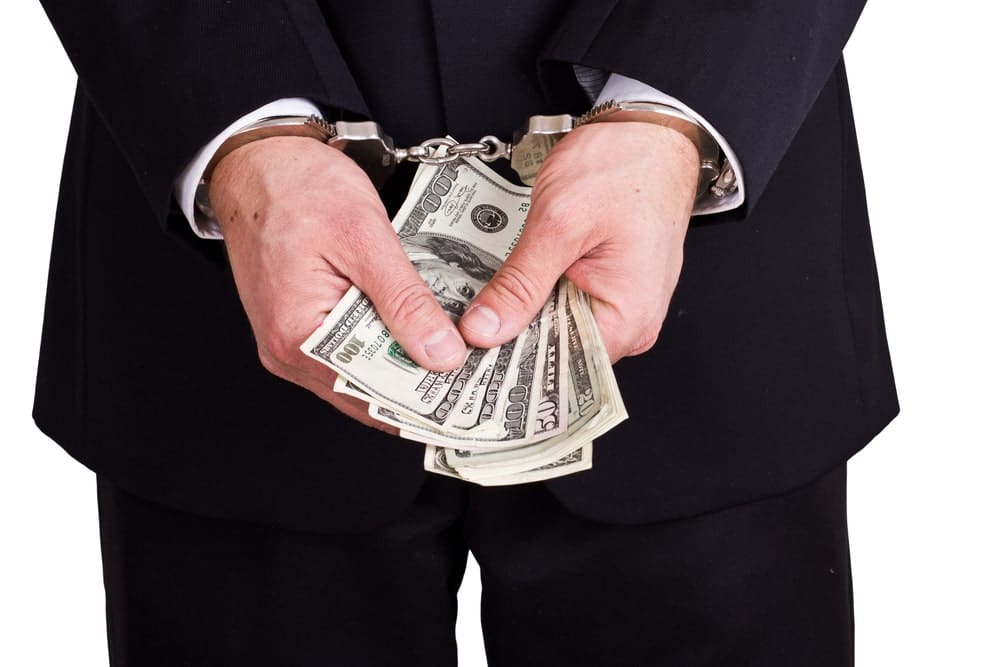Most of these cases involve intentionally failing to pay federal taxes but, thankfully, compared with the number of taxpayers in Maine, these cases are relatively rare—and the number of federal tax fraud cases is decreasing.
Any tax fraud or tax evasion investigation must be taken seriously and seeking the appropriate legal assistance should be a priority even before criminal charges are filed.
Call 207-571-8146 or contact us online to schedule a consult with one of our highly skilled criminal defense & OUI lawyers, serving Southern Maine, today.
Table of Contents
What is tax fraud?
Tax fraud laws in Maine are covered under Maine Revised Statutes §184-A: Intentional Evasion of Tax.
Under these laws, taxpayers who commit any act that intentionally avoids paying taxes are guilty of the crime of tax evasion. This can result in heavy fines and even prison sentences.
The severity of the consequences depends on the amounts involved in the alleged tax evasion case. If the amount of evaded tax is $2,000 or less, it is a Class D crime in Maine. If the amount is over $2,000, Class C criminal charges can be filed.
If you are charged federally under the United States Code (U.S.C.), the penalties are likely to be harsher (as illustrated below).
Unintentional failure to pay tax may be categorized as negligence rather than fraud or deliberate tax evasion. Many people do not understand the complex tax codes and make unintentional mistakes when paying taxes. If this is proven, taxpayers cannot be convicted of tax fraud. A conviction requires an intentional act. However, they may be required to pay “back taxes” PLUS a penalty amount of 25 percent of the underpayment.
What are the penalties for intentional evasion of tax in Maine?
A conviction for tax evasion in Maine may result in the following penalties:
- Tax amount of $2,000 or less: Class D crime punishable by imprisonment for up to one year, and/or a fine of up to $2,000.
- Tax amount of more than $2,000: Class C crime punishable by imprisonment for up to five years, and/or a fine of up to $5,000.
Offenders may also be required to pay a penalty of 75 percent of underpaid taxes in addition to the tax amount that is owed.
Federal tax evasion crimes and penalties are classified differently under the U.S.C. The government defines tax evasion in 26 U.S.C. § 7201 as the willful attempt to defeat or evade a tax.
Ultimately, anyone who provides fraudulent information to the Internal Revenue Service (IRS) or employees regarding withholdings, exemptions, income, or other tax-related information can be convicted of a felony. Here is a summary of the penalties associated with various acts of federal tax evasion:
- Fraudulent Statements/Failure to Make Statement to Employees (26 U.S.C. §7204): Maximum fine of $1,000; up to one year in prison; or both
- Fraudulent Withholding Exemption Certificate/Failure to Supply Info (26 U.S.C. §7205): Maximum fine of $1,000; up to one year in prison; or both
- Fraud and False Statements (26 U.S.C. §7206): Maximum fine of $100,000; three years in prison; or both
- Fraudulent Returns, Statements, or Other Documents (26 U.S.C. §7207): Maximum fine of $10,000; one year in prison; or both
The maximum punishment for a defendant in a federal tax evasion case is five years in federal prison, a $100,000 fine, or both.
Note that corporate tax fraud offenses are dealt with even more harshly at the federal level, most notably with even more substantial fines.
Call 207-571-8146 or contact us online to schedule a consult with one of our highly skilled criminal defense & OUI lawyers, serving Southern Maine, today.
What to do when facing tax evasion charges in Maine?
Unfortunately, if you are facing federal or state tax evasion charges, prosecutors have the power to convince judges or juries that “probable cause” of a crime having been committed exists. Therefore, it can be challenging to have the evidence against you dismissed.
However, working with an experienced tax fraud defense lawyer immediately upon learning of a tax fraud investigation against you will help lessen the impact of the charges on your future.
If state prosecutors charge you, seek the assistance of our experienced tax fraud attorneys who are familiar with the local tax and criminal justice system. If the charges are federal, urgently contact one of our federal tax evasion lawyers with relevant prior experience to defend the charges against you.
Why do you need a tax evasion lawyer in Maine?
You have seen the penalties. A conviction for a tax crime at the state or federal level has the potential to impact you long into the future.
A suitably qualified tax fraud lawyer can help you navigate troubled times, understand the criminal justice processes you will face, and most importantly, avoid the worst consequences.
However, it is important to contact a lawyer as early as possible in the investigation.
How to avoid prosecution for federal tax evasion
The brutal truth is that most people who face a federal charge of tax evasion end up in prison. Often, that is because the accused makes inadvisable moves after the investigation begins against them.
Equally, not all investigations end up in a criminal charge. Federal prosecutors tend to set the bar high with the burden of proof in tax evasion cases and may be open to plea bargaining.
If a federal investigation is launched against you, the guidance of a suitably qualified federal tax evasion lawyer can ensure that you do not harm your legal position with misguided actions.
With a federal tax fraud attorney at your side as the investigation is launched, you will be better equipped to plea bargain and avoid a federal indictment. This generally involves trying to persuade government officials that the alleged tax evasion was not a willful attempt to defraud the IRS but a genuine mistake or oversight. This is no easy task, but often possible with the right planning, preparation, and a “good faith” strategy.
The IRS generally prefers payment to prosecution. Those being investigated may be able to work out a payment plan with the IRS before being indicted. Your tax fraud attorney will help you do this, shielding you from mistakes and plotting the best possible course forward if an investigation is launched.
If you are being investigated for tax fraud in Maine—or have already been charged—contact The Maine Criminal Defense Group directly online or call us at (207) 571-8146 to speak with an experienced criminal defense lawyer who can help you
Call 207-571-8146 or contact us online to schedule a consult with one of our highly skilled criminal defense & OUI lawyers, serving Southern Maine, today.
Blog Posts

Today’s topic of discussion concerns the crime of theft of services. Now let’s take, for example, you go to your local auto mechanic. He fixes your car. You don’t like[...]

When most people think of “white collar” crime, they tend to think of the numerous high profile examples, such as the Enron scandal, or the insider trading scandal involving Martha[...]

Theft comes in many different forms, but every specific form shares the same general characteristic: the thief acts with an underlying intent to take property from its rightful owner. The[...]

You might think of robbery, theft, and burglary as near-identical crimes. Those offenses may result in a similar outcome for the victim – loss of property or assets – but[...]

An increase in shoplifting offenses in Chicago has many business owners pointing fingers at the district attorney there, who had changed her office’s policy to reduce the number of felony-level[...]

A Maine native was recently arrested for shoplifting in New Jersey. The details of his arrest highlight an important issue with Maine’s shoplifting law: even empty accusations of shoplifting can[...]

Over $100,000 in merchandise was taken from a jewelry store in Farmingdale back in early August. The incident highlights the difference between shoplifting and some more severe criminal charges like[...]

The recent mass shooting in El Paso has boiled over into a larger discussion of the strain that Walmart stores put on their local communities, particularly local police departments. With[...]

A general overview of the crime statistics in Maine paints an interesting picture of law enforcement throughout the state. A key takeaway of those statistics, though, is that shoplifting is[...]

A report of shoplifting has snowballed into far more severe criminal allegations for a teenager in Aroostook County. Now he is being charged with drug possession and other offenses related[...]


